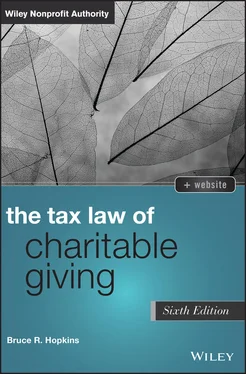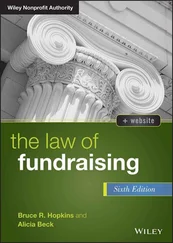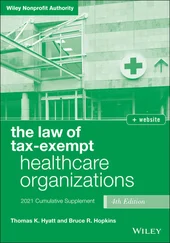Bruce R. Hopkins - The Tax Law of Charitable Giving
Здесь есть возможность читать онлайн «Bruce R. Hopkins - The Tax Law of Charitable Giving» — ознакомительный отрывок электронной книги совершенно бесплатно, а после прочтения отрывка купить полную версию. В некоторых случаях можно слушать аудио, скачать через торрент в формате fb2 и присутствует краткое содержание. Жанр: unrecognised, на английском языке. Описание произведения, (предисловие) а так же отзывы посетителей доступны на портале библиотеки ЛибКат.
- Название:The Tax Law of Charitable Giving
- Автор:
- Жанр:
- Год:неизвестен
- ISBN:нет данных
- Рейтинг книги:5 / 5. Голосов: 1
-
Избранное:Добавить в избранное
- Отзывы:
-
Ваша оценка:
- 100
- 1
- 2
- 3
- 4
- 5
The Tax Law of Charitable Giving: краткое содержание, описание и аннотация
Предлагаем к чтению аннотацию, описание, краткое содержание или предисловие (зависит от того, что написал сам автор книги «The Tax Law of Charitable Giving»). Если вы не нашли необходимую информацию о книге — напишите в комментариях, мы постараемся отыскать её.
The Tax Law of Charitable Giving — читать онлайн ознакомительный отрывок
Ниже представлен текст книги, разбитый по страницам. Система сохранения места последней прочитанной страницы, позволяет с удобством читать онлайн бесплатно книгу «The Tax Law of Charitable Giving», без необходимости каждый раз заново искать на чём Вы остановились. Поставьте закладку, и сможете в любой момент перейти на страницу, на которой закончили чтение.
Интервал:
Закладка:
Tax exemption for categories of nonprofit organizations can arise as a by-product of enactment of other legislation. In these instances, tax exemption is granted to facilitate accomplishment of the purpose of another legislative end. Thus, tax-exempt status has been approved for funds underlying employee benefit programs. Other examples include tax exemption for professional football leagues that emanated out of the merger of the National Football League and the American Football League, and for state-sponsored providers of health care to the needy, which was required to accommodate the goals of Congress in creating health care delivery legislation.
There is a pure tax rationale for some tax-exempt organizations. Social clubs stand out as an illustration of this category.
The fourth rationale for tax-exempt status is a policy one—not tax policy, but policy with regard to less essential elements of the structure of a civil society. This is why, for example, tax-exempt status has been granted to entities as diverse as fraternal organizations, title-holding companies, farmers' cooperatives, certain insurance companies, and prepaid tuition plans.
The fifth rationale for tax-exempt status rests solidly on a philosophical principle. Yet, there are degrees of scale here; some principles are less majestic than others. Thus, there are nonprofit organizations that are tax-exempt because their objectives are of direct importance to a significant segment of society and indirectly of consequence to all of society. Within this frame lies the rationale for tax exemption for entities such as labor organizations, trade and business associations, and veterans' organizations.
The sixth rationale for tax-exempt status for nonprofit organizations is predicated on the view that exemption is required to facilitate achievement of an end of significance to the entirety of society. Most organizations that are generally thought of as charitable in nature 21 are entities that are meaningful to the structure and functioning of society in the United States. At least to some degree, this rationale embraces social welfare organizations. This rationale may be termed the public policy rationale. 22
(a) Public Policy and National Heritage
The public policy rationale is one involving political philosophy rather than tax policy. The key concept underlying this philosophy is pluralism —more accurately, the pluralism of institutions, which is a function of competition between various institutions within the three sectors of society. In this context, the competition is between the nonprofit and governmental sectors. This element is particularly critical in the United States, whose history originates in distrust of government. (When the issue is unrelated business income taxation, the matter is one of competition between the nonprofit and for-profit sectors.) Here, the nonprofit sector serves as an alternative to the governmental sector as a means of addressing society's problems.
One of the greatest exponents of pluralism was John Stuart Mill. He wrote in On Liberty , published in 1859:
In many cases, though individuals may not do the particular thing so well, on the average, as officers of government, it is nevertheless desirable that it should be done by them, rather than by the government, as a means to their own mental education—a mode of strengthening their active faculties, exercising their judgment, and giving them a familiar knowledge of the subjects with which they are thus left to deal. This is a principal, though not the sole, recommendation of . . . the conduct of industrial and philanthropic enterprises by voluntary associations.
Following a discussion of the importance of “individuality of development, and diversity of modes of action,” Mill wrote:
Government operations tend to be everywhere alike. With individuals and voluntary associations, on the contrary, there are varied experiments, and endless diversity of experience. What the State can usefully do is to make itself a central depository, and active circulator and diffuser, of the experience resulting from many trials. Its business is to enable each experimentalist to benefit by the experiments of others; instead of tolerating no experiments but its own.
This conflict among the sectors—a sorting out of the appropriate role of governments and nonprofit organizations—is, in a healthy society, a never-ending process, ebbing and flowing with the politics of the day. A Congress may work to reduce the scope of the federal government and a president may proclaim that the “era of big government is over,” while a preceding and/or succeeding generation may celebrate strong central government.
One of the greatest commentators on the impulse and tendency in the United States to utilize nonprofit organizations was Alexis de Tocqueville. Writing in 1835, in Democracy in America , he observed:
Feelings and opinions are recruited, the heart is enlarged, and the human mind is developed only by the reciprocal influence of men upon one another. I have shown that these influences are almost null in democratic countries; they must therefore be artificially created, and this can only be accomplished by associations.
De Tocqueville's classic formulation on this subject came in his portrayal of Americans' use of “public associations” as a critical element of the societal structure:
Americans of all ages, all conditions, and all dispositions constantly form associations. They have not only commercial and manufacturing companies, in which all take part, but associations of a thousand other kinds, religious, moral, serious, futile, general or restricted, enormous or diminutive. The Americans make associations to give entertainments, to found seminaries, to build inns, to construct churches, to diffuse books, to send missionaries to the antipodes; in this manner they found hospitals, prisons, and schools. If it is proposed to inculcate some truth or to foster some feeling by the encouragement of a great example, they form a society. Wherever at the head of some new undertaking you see the government in France, or a man of rank in England, in the United States you will be sure to find an association.
This was the political philosophical climate concerning nonprofit organizations in place when Congress, toward the close of the nineteenth century, began considering enactment of an income tax. Although courts would subsequently articulate policy rationales for tax exemption, one of the failures of American jurisprudence is that the Supreme Court and the lower courts have never adequately articulated the public policy doctrine.
Contemporary Congresses legislate by writing far more intricate statutes than their forebears, and in doing so usually leave in their wake rich deposits in the form of extensive legislative histories. Thus, it is far easier to ascertain what a recent Congress meant when creating a law than is the case with respect to an enactment ushered in decades ago.
At the time a constitutional income tax was coming into existence (enacted in 1913 23 ), Congress legislated in spare language and rarely embellished upon its statutory handiwork with legislative histories. Therefore, there is no contemporary record, in the form of legislative history, of what members of Congress had in mind when they first started creating categories of charitable and other tax-exempt organizations. Congress, it is generally assumed, saw itself doing what other legislative bodies have done over the centuries. One observer stated that the “history of mankind reflects that our early legislators were not setting precedent by exempting religious or charitable organizations” from income tax. 24 That is, the political philosophical policy considerations pertaining to nonprofit organizations were such that taxation of these entities—considering their contributions to the well-being and functioning of society—was unthinkable.
Читать дальшеИнтервал:
Закладка:
Похожие книги на «The Tax Law of Charitable Giving»
Представляем Вашему вниманию похожие книги на «The Tax Law of Charitable Giving» списком для выбора. Мы отобрали схожую по названию и смыслу литературу в надежде предоставить читателям больше вариантов отыскать новые, интересные, ещё непрочитанные произведения.
Обсуждение, отзывы о книге «The Tax Law of Charitable Giving» и просто собственные мнения читателей. Оставьте ваши комментарии, напишите, что Вы думаете о произведении, его смысле или главных героях. Укажите что конкретно понравилось, а что нет, и почему Вы так считаете.












